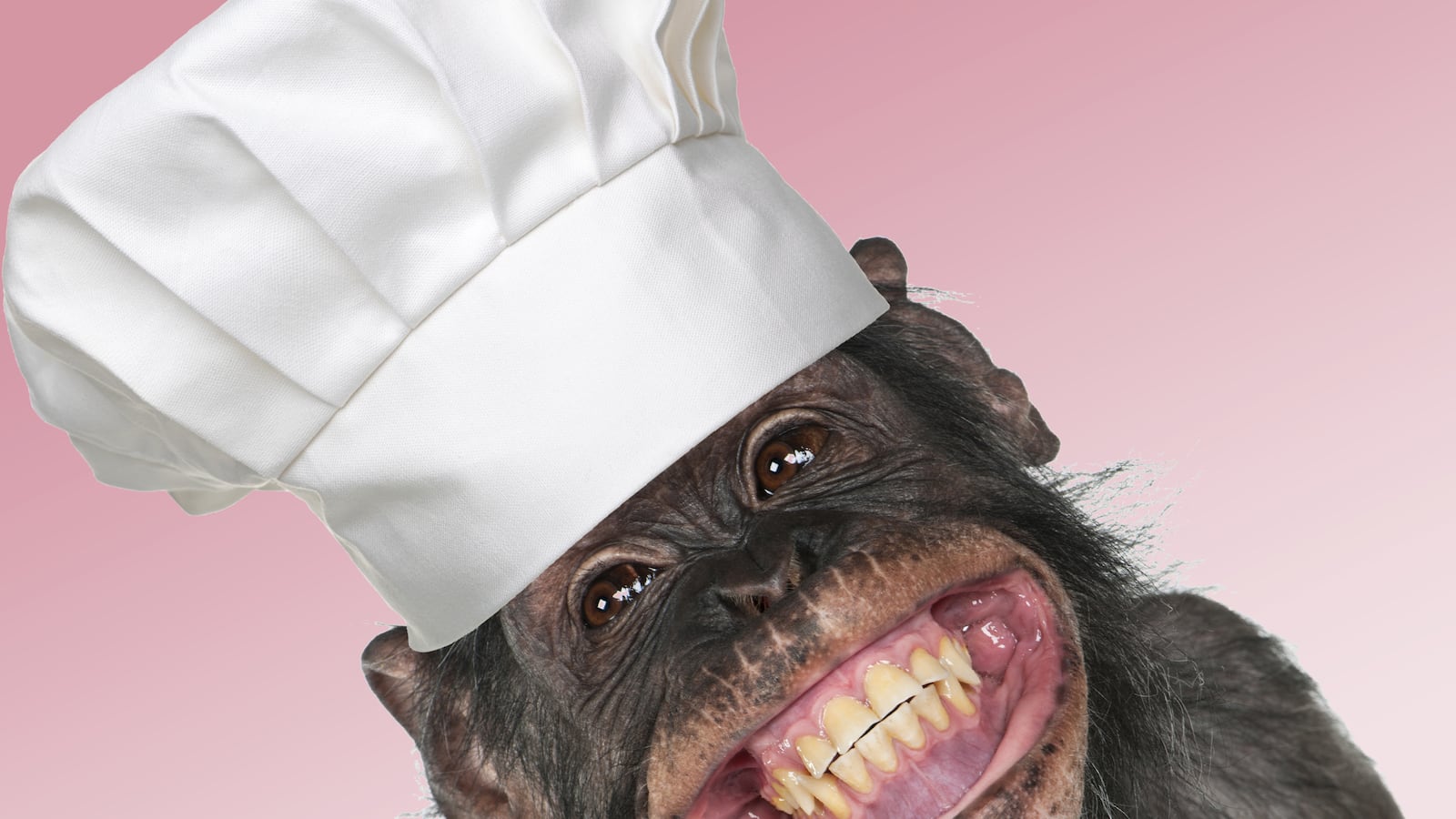Sometime in our ancient past, one of our ancestors took a look at a raw haunch of antelope and thought, “Damn, that would make a good roast.”
But that idle thought actually hides a sophisticated thought process. Turning that hunk of flesh into a succulent dinner requires not only the control of fire, but also the ability to forgo eating the raw meat right away, plan the cooking process, and wait while the dish cooks. All of these are cognitive tasks thought to be exclusively human, but a new study shows that chimpanzees also have many of these cognitive and emotional abilities. In short, chimps have many of the mental skills that cooking requires.
“‘Master Chef’ started half a million years ago, and the stakes are passing along your DNA,” said neuroanthropologist Greg Downey of Macquarie University in Australia. In other words, cooking is a survival trait that kept our lineage afloat in the gene pool.
Cooking, whether of antelope or starchy tubers like potatoes, is one of the things that sets us apart from other animals and, according to some anthropologists, has helped to alter our evolutionary trajectory. Hominin hearths used for cooking date back to at least 500,000 years ago, and our ancestors may have begun cooking long before that, not long after we gained the ability to control fire. Cooked food is easier to digest, allowing animals to extract more energy from food, which may have helped fuel the growth of our large brains.
But cooking requires more than just meat, potatoes, and fire. Would-be chefs need to be able to transport food that they find back to the hearth, plan how they are going to cook their food, wait minutes or hours while it cooks, and not steal another’s food that might be cooking nearby. These are complicated cognitive and emotional tasks that we still continue to struggle with—after all, most cooks sneak a taste of their meal because it looks so inviting. But without a firm date for the domestication of fire and the advent of cooking, it’s unclear how ancient this struggle really is.
“The first acts of cooking were likely accidental,” such as a stray lightning strike starting a wildfire, which cooked some collected food, Downey said. “But until all of the mental dimensions were in place, the accident couldn’t become an insight. There were probably a lot of blackened dinners at first.”
Felix Warneken, a psychologist at Harvard, and Alexandra Rosati, a psychology postdoc at Yale, tried to answer these questions in chimpanzees, who last shared an ancestor with humans about 5 to 7 million years ago. They developed a series of increasingly difficult cognitive tasks for a large group of chimpanzees in the Tchimpounga Chimpanzee Sanctuary in the Republic of Congo, beginning with the most basic question of all: Did chimps even prefer cooked food?
Indeed they did. They were also willing to wait to eat cooked food instead of eating raw food right away. Then Warneken and Rosati introduced a “cooking device,” really just a lidded bowl with a false bottom. The chimps placed a raw potato in the device and the researcher shook it. When the bowl was opened, a piece of cooked potato was revealed. They preferred to have the researchers “cook” their food in this device compared to a similar control device in which the same piece of raw food was revealed. When the chimps got to choose for themselves the container in which they placed their food, they chose the cooking device 85 percent of the time.
The chimps also preferred certain types of cooked food over others. In particular, the chimpanzees preferred cooked potato over cooked carrots. Early humans were thought to rely heavily on starchy tubers, which are “a very difficult food source to exploit. Raw potatoes are super lame,” Rosati said.
Foods like carrots, and fruits like apples and bananas, already have most of their energy readily available to primates, making cooking less beneficial. Importantly, some chimpanzees also showed the ability to save their food for future cooking, one of the biggest cognitive hurdles to overcome.
“They have all these skills, like causal reasoning, planning, and self-control, that you would need to cook. As soon as fire was controlled, it’s plausible that cooking started right after,” Rosati said.
“This study did a great job of picking apart the cognitive and emotional skills that our ancestors would have needed in order to begin cooking,” Downey said.
Of course, chimpanzees can’t control fire, so they can’t actually cook. However, the results, published in Proceedings of the Royal Society B, show that chimpanzees have many of the other mental requirements of cooking. But Downey points out that cooking was unlikely to evolve in chimps for another important reason.
“A mother chimp will nurse her baby, but she really struggles to share food with her offspring. Humans, on the other hand, will chew up food and spit it into the mouths of their babies. You’d never see a chimp doing that,” Downey said.
That humans were able to do this ultimately changed our evolutionary trajectory, according to Harvard primatologist and anthropologist Richard Wrangham, author of the book Catching Fire: How Cooking Made Us Human. Brains require a lot of fuel, burning around 500 calories per day, around one-quarter of a human’s daily energy intake. Getting that kind of energy is nearly impossible on the type of raw food diet eaten by chimpanzees.
“They spend five to six hours each day just chewing. That just wipes out a big chunk of the day just chewing our food because it’s not processed externally,” Downey said.
Cooking frees up energy in several ways. For one, the processing inherent in cooking makes it easier to extract calories from food, giving our brains the nutrition they need. For another, cooked food is easier to digest, which means our GI tracts can become smaller and simpler. Since digestion is another energy-intensive process, it frees up even more energy for our brains.
“Cows have four stomachs because they eat very energy-poor food, but you don’t need four stomachs to digest a banana. It frees up more energy to grow a brain,” Rosati said.
Cooking meant bigger brains, and hominins with bigger brains could devise newer ways of hunting and cooking, creating a positive feedback loop that led, ultimately, to us.





